BSc Business Management: Analysis of UK Legal & Employment Law
VerifiedAdded on 2023/06/10
|9
|2719
|295
Report
AI Summary
This report provides a comprehensive analysis of the UK legal system for business, focusing on classifications of law, sources of law, and employment law. It defines laws and identifies the legal systems in the UK, explaining civil and criminal law with examples. The roles of the High Court and Supreme Court are discussed, along with case law and the process of making legislation. The report also covers statutory duties of employers to their employees, wrongful dismissal, and unfair dismissal actions, providing a thorough overview of the legal landscape affecting businesses in the UK. Desklib offers solved assignments and past papers for students.
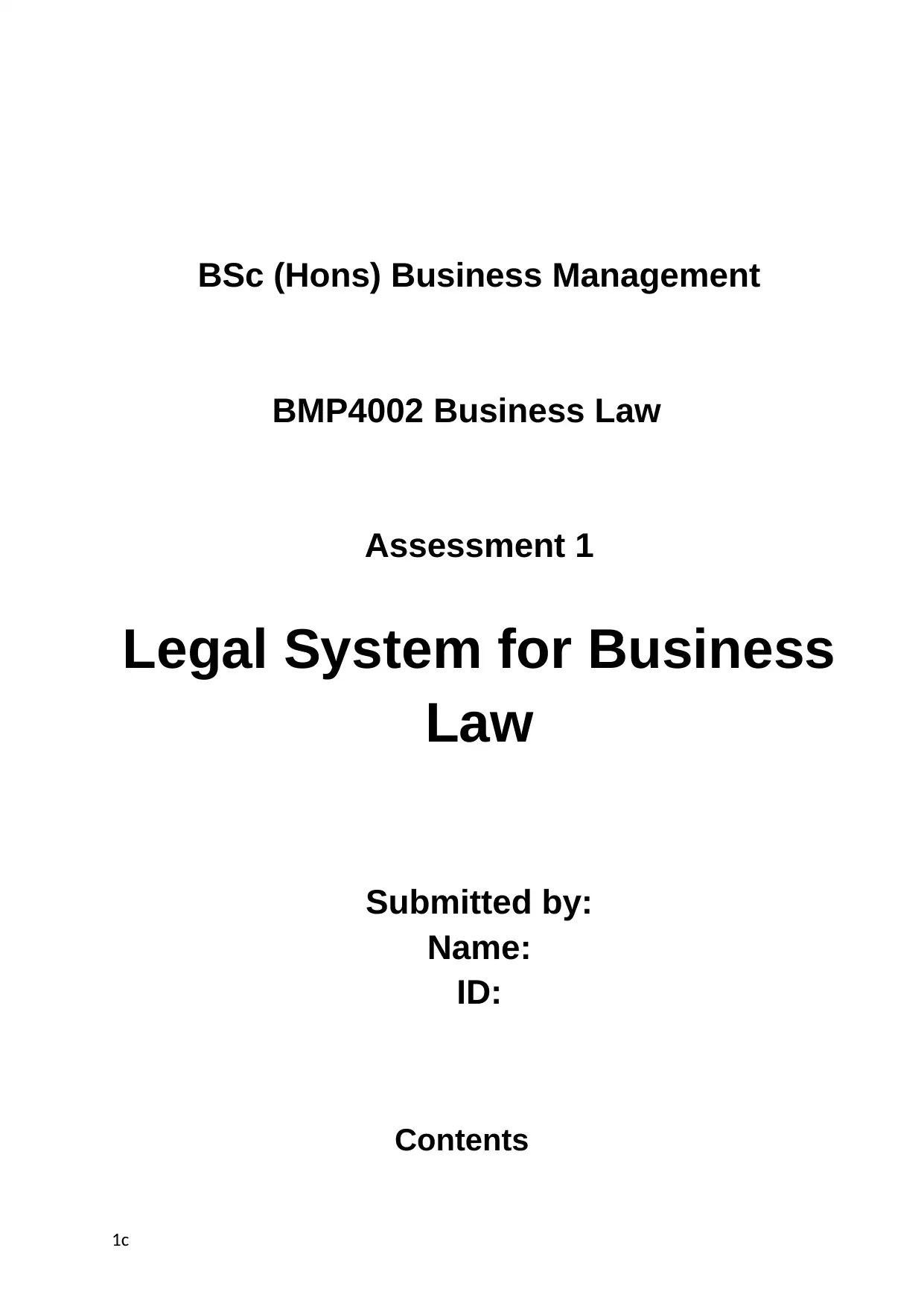
BSc (Hons) Business Management
BMP4002 Business Law
Assessment 1
Legal System for Business
Law
Submitted by:
Name:
ID:
Contents
1c
BMP4002 Business Law
Assessment 1
Legal System for Business
Law
Submitted by:
Name:
ID:
Contents
1c
Paraphrase This Document
Need a fresh take? Get an instant paraphrase of this document with our AI Paraphraser
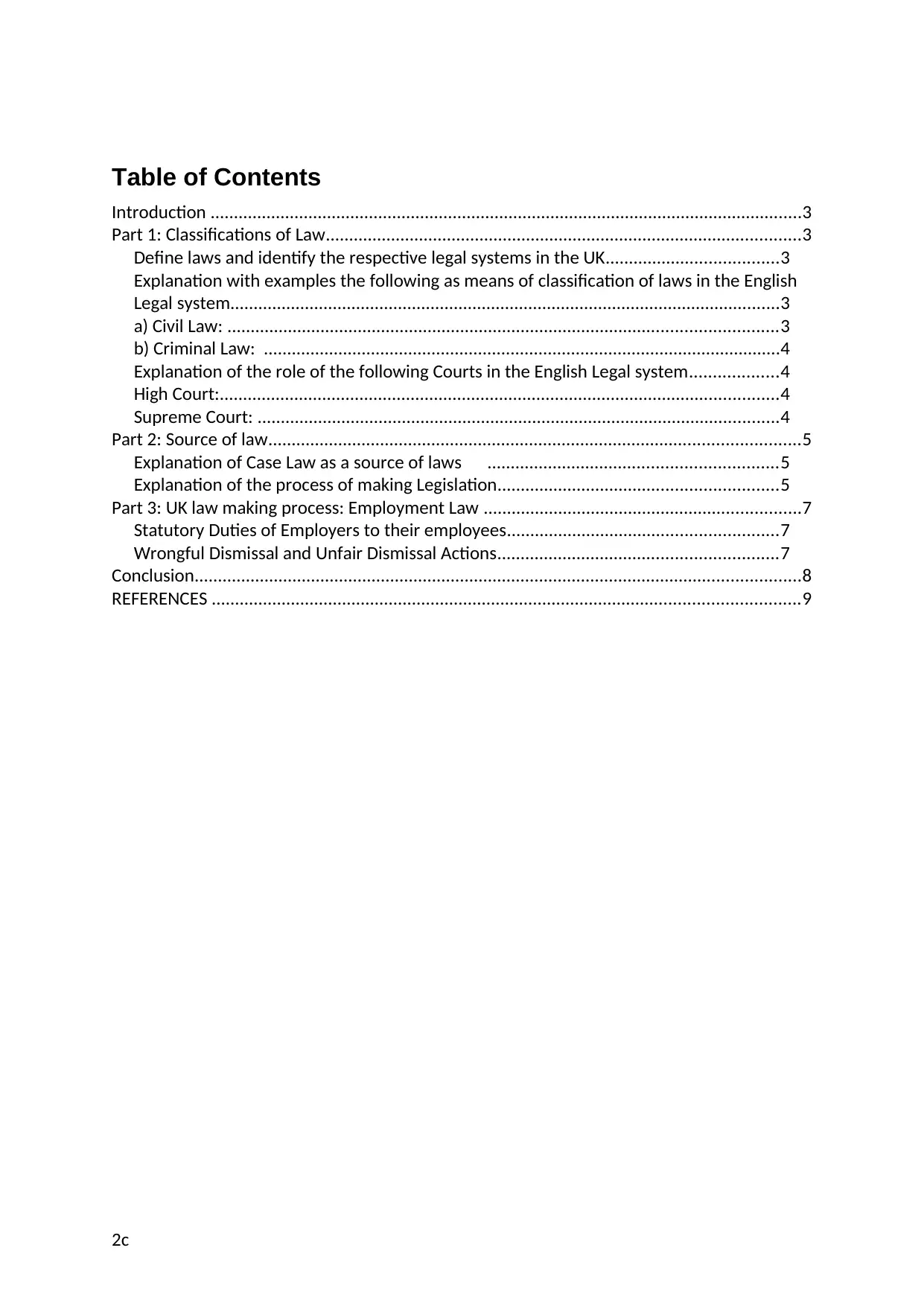
Table of Contents
Introduction ...............................................................................................................................3
Part 1: Classifications of Law......................................................................................................3
Define laws and identify the respective legal systems in the UK.....................................3
Explanation with examples the following as means of classification of laws in the English
Legal system......................................................................................................................3
a) Civil Law: ......................................................................................................................3
b) Criminal Law: ...............................................................................................................4
Explanation of the role of the following Courts in the English Legal system...................4
High Court:........................................................................................................................4
Supreme Court: ................................................................................................................4
Part 2: Source of law..................................................................................................................5
Explanation of Case Law as a source of laws ..............................................................5
Explanation of the process of making Legislation............................................................5
Part 3: UK law making process: Employment Law ....................................................................7
Statutory Duties of Employers to their employees..........................................................7
Wrongful Dismissal and Unfair Dismissal Actions............................................................7
Conclusion..................................................................................................................................8
REFERENCES ..............................................................................................................................9
2c
Introduction ...............................................................................................................................3
Part 1: Classifications of Law......................................................................................................3
Define laws and identify the respective legal systems in the UK.....................................3
Explanation with examples the following as means of classification of laws in the English
Legal system......................................................................................................................3
a) Civil Law: ......................................................................................................................3
b) Criminal Law: ...............................................................................................................4
Explanation of the role of the following Courts in the English Legal system...................4
High Court:........................................................................................................................4
Supreme Court: ................................................................................................................4
Part 2: Source of law..................................................................................................................5
Explanation of Case Law as a source of laws ..............................................................5
Explanation of the process of making Legislation............................................................5
Part 3: UK law making process: Employment Law ....................................................................7
Statutory Duties of Employers to their employees..........................................................7
Wrongful Dismissal and Unfair Dismissal Actions............................................................7
Conclusion..................................................................................................................................8
REFERENCES ..............................................................................................................................9
2c
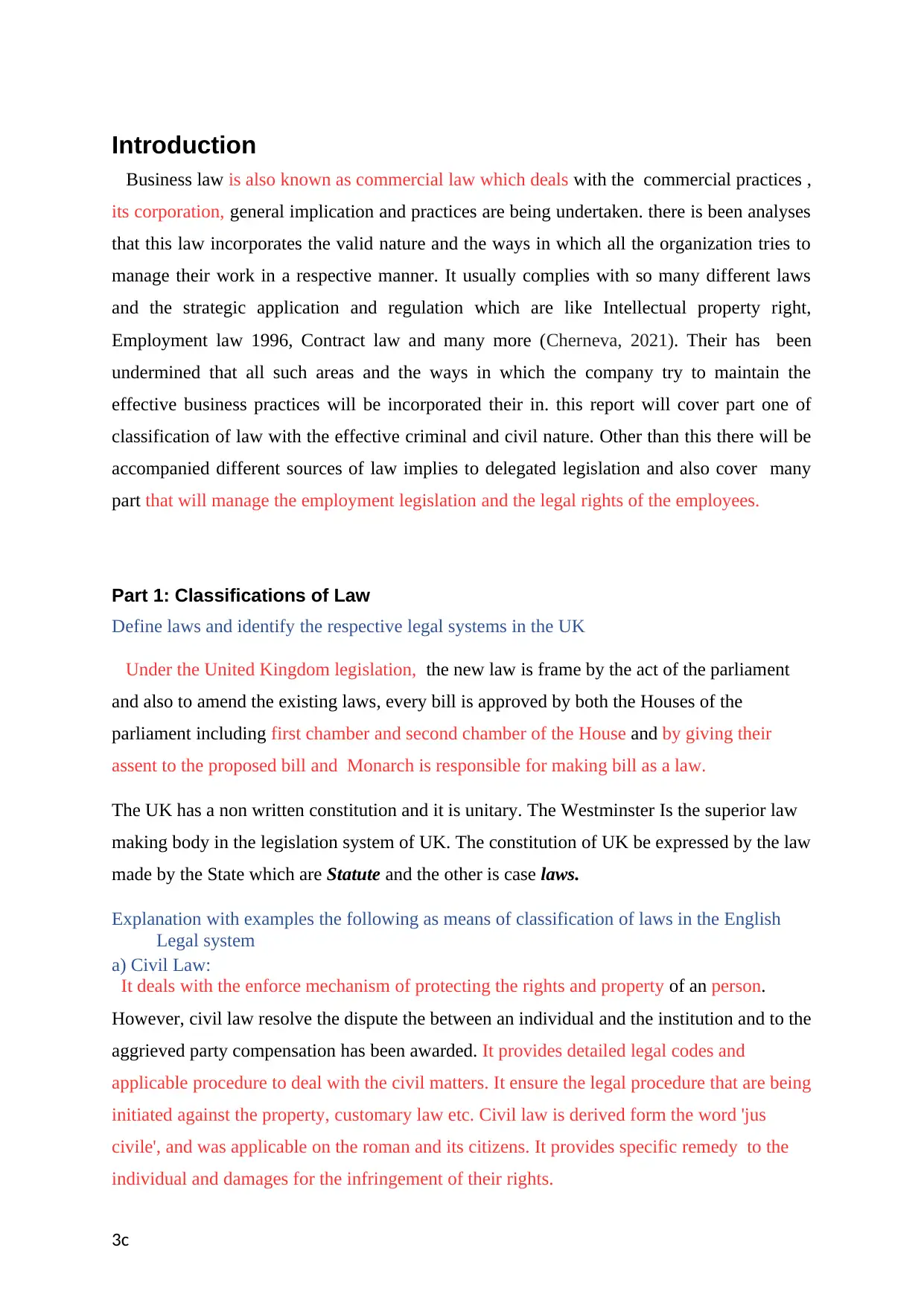
Introduction
Business law is also known as commercial law which deals with the commercial practices ,
its corporation, general implication and practices are being undertaken. there is been analyses
that this law incorporates the valid nature and the ways in which all the organization tries to
manage their work in a respective manner. It usually complies with so many different laws
and the strategic application and regulation which are like Intellectual property right,
Employment law 1996, Contract law and many more (Cherneva, 2021). Their has been
undermined that all such areas and the ways in which the company try to maintain the
effective business practices will be incorporated their in. this report will cover part one of
classification of law with the effective criminal and civil nature. Other than this there will be
accompanied different sources of law implies to delegated legislation and also cover many
part that will manage the employment legislation and the legal rights of the employees.
Part 1: Classifications of Law
Define laws and identify the respective legal systems in the UK
Under the United Kingdom legislation, the new law is frame by the act of the parliament
and also to amend the existing laws, every bill is approved by both the Houses of the
parliament including first chamber and second chamber of the House and by giving their
assent to the proposed bill and Monarch is responsible for making bill as a law.
The UK has a non written constitution and it is unitary. The Westminster Is the superior law
making body in the legislation system of UK. The constitution of UK be expressed by the law
made by the State which are Statute and the other is case laws.
Explanation with examples the following as means of classification of laws in the English
Legal system
a) Civil Law:
It deals with the enforce mechanism of protecting the rights and property of an person.
However, civil law resolve the dispute the between an individual and the institution and to the
aggrieved party compensation has been awarded. It provides detailed legal codes and
applicable procedure to deal with the civil matters. It ensure the legal procedure that are being
initiated against the property, customary law etc. Civil law is derived form the word 'jus
civile', and was applicable on the roman and its citizens. It provides specific remedy to the
individual and damages for the infringement of their rights.
3c
Business law is also known as commercial law which deals with the commercial practices ,
its corporation, general implication and practices are being undertaken. there is been analyses
that this law incorporates the valid nature and the ways in which all the organization tries to
manage their work in a respective manner. It usually complies with so many different laws
and the strategic application and regulation which are like Intellectual property right,
Employment law 1996, Contract law and many more (Cherneva, 2021). Their has been
undermined that all such areas and the ways in which the company try to maintain the
effective business practices will be incorporated their in. this report will cover part one of
classification of law with the effective criminal and civil nature. Other than this there will be
accompanied different sources of law implies to delegated legislation and also cover many
part that will manage the employment legislation and the legal rights of the employees.
Part 1: Classifications of Law
Define laws and identify the respective legal systems in the UK
Under the United Kingdom legislation, the new law is frame by the act of the parliament
and also to amend the existing laws, every bill is approved by both the Houses of the
parliament including first chamber and second chamber of the House and by giving their
assent to the proposed bill and Monarch is responsible for making bill as a law.
The UK has a non written constitution and it is unitary. The Westminster Is the superior law
making body in the legislation system of UK. The constitution of UK be expressed by the law
made by the State which are Statute and the other is case laws.
Explanation with examples the following as means of classification of laws in the English
Legal system
a) Civil Law:
It deals with the enforce mechanism of protecting the rights and property of an person.
However, civil law resolve the dispute the between an individual and the institution and to the
aggrieved party compensation has been awarded. It provides detailed legal codes and
applicable procedure to deal with the civil matters. It ensure the legal procedure that are being
initiated against the property, customary law etc. Civil law is derived form the word 'jus
civile', and was applicable on the roman and its citizens. It provides specific remedy to the
individual and damages for the infringement of their rights.
3c
⊘ This is a preview!⊘
Do you want full access?
Subscribe today to unlock all pages.

Trusted by 1+ million students worldwide
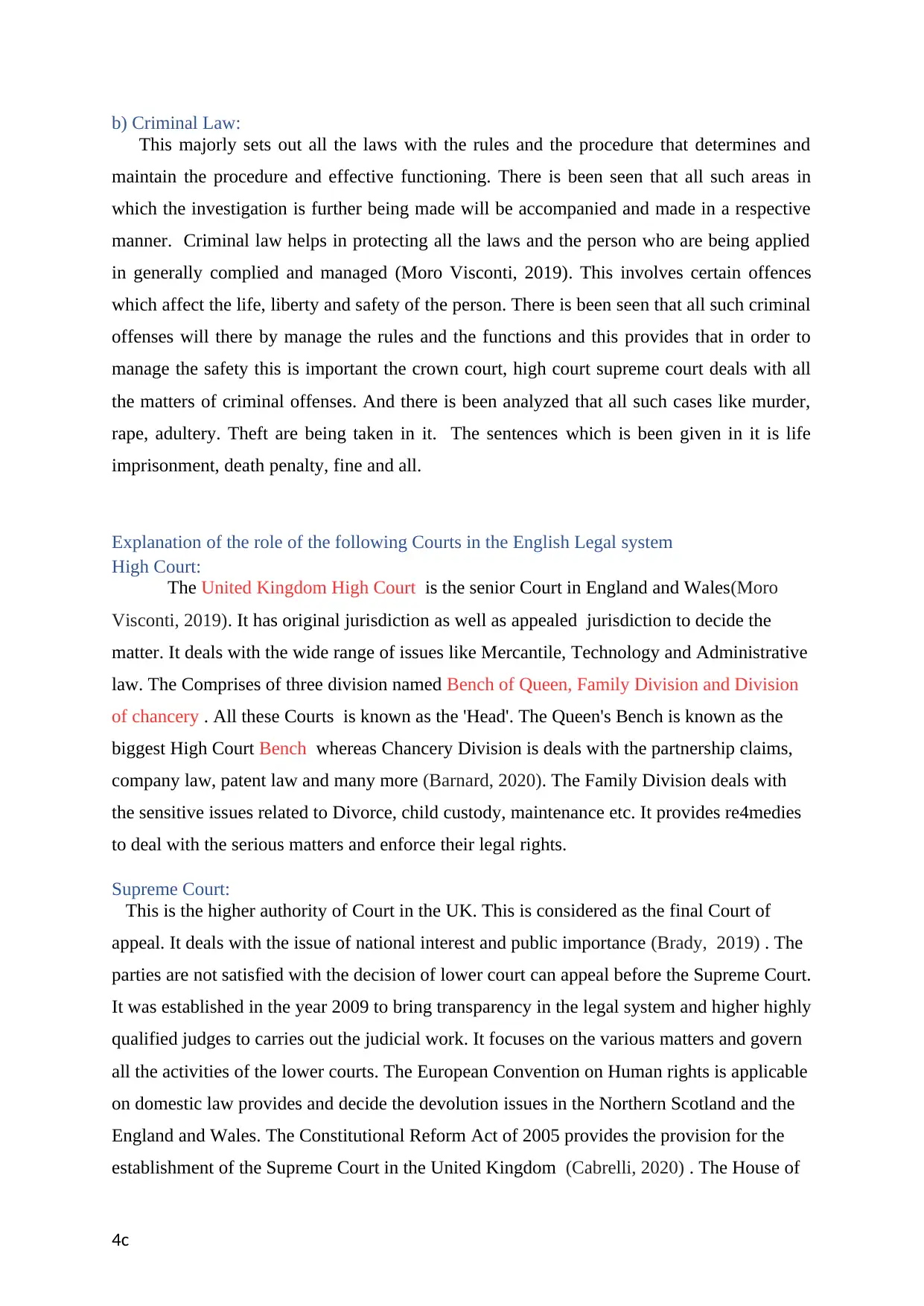
b) Criminal Law:
This majorly sets out all the laws with the rules and the procedure that determines and
maintain the procedure and effective functioning. There is been seen that all such areas in
which the investigation is further being made will be accompanied and made in a respective
manner. Criminal law helps in protecting all the laws and the person who are being applied
in generally complied and managed (Moro Visconti, 2019). This involves certain offences
which affect the life, liberty and safety of the person. There is been seen that all such criminal
offenses will there by manage the rules and the functions and this provides that in order to
manage the safety this is important the crown court, high court supreme court deals with all
the matters of criminal offenses. And there is been analyzed that all such cases like murder,
rape, adultery. Theft are being taken in it. The sentences which is been given in it is life
imprisonment, death penalty, fine and all.
Explanation of the role of the following Courts in the English Legal system
High Court:
The United Kingdom High Court is the senior Court in England and Wales(Moro
Visconti, 2019). It has original jurisdiction as well as appealed jurisdiction to decide the
matter. It deals with the wide range of issues like Mercantile, Technology and Administrative
law. The Comprises of three division named Bench of Queen, Family Division and Division
of chancery . All these Courts is known as the 'Head'. The Queen's Bench is known as the
biggest High Court Bench whereas Chancery Division is deals with the partnership claims,
company law, patent law and many more (Barnard, 2020). The Family Division deals with
the sensitive issues related to Divorce, child custody, maintenance etc. It provides re4medies
to deal with the serious matters and enforce their legal rights.
Supreme Court:
This is the higher authority of Court in the UK. This is considered as the final Court of
appeal. It deals with the issue of national interest and public importance (Brady, 2019) . The
parties are not satisfied with the decision of lower court can appeal before the Supreme Court.
It was established in the year 2009 to bring transparency in the legal system and higher highly
qualified judges to carries out the judicial work. It focuses on the various matters and govern
all the activities of the lower courts. The European Convention on Human rights is applicable
on domestic law provides and decide the devolution issues in the Northern Scotland and the
England and Wales. The Constitutional Reform Act of 2005 provides the provision for the
establishment of the Supreme Court in the United Kingdom (Cabrelli, 2020) . The House of
4c
This majorly sets out all the laws with the rules and the procedure that determines and
maintain the procedure and effective functioning. There is been seen that all such areas in
which the investigation is further being made will be accompanied and made in a respective
manner. Criminal law helps in protecting all the laws and the person who are being applied
in generally complied and managed (Moro Visconti, 2019). This involves certain offences
which affect the life, liberty and safety of the person. There is been seen that all such criminal
offenses will there by manage the rules and the functions and this provides that in order to
manage the safety this is important the crown court, high court supreme court deals with all
the matters of criminal offenses. And there is been analyzed that all such cases like murder,
rape, adultery. Theft are being taken in it. The sentences which is been given in it is life
imprisonment, death penalty, fine and all.
Explanation of the role of the following Courts in the English Legal system
High Court:
The United Kingdom High Court is the senior Court in England and Wales(Moro
Visconti, 2019). It has original jurisdiction as well as appealed jurisdiction to decide the
matter. It deals with the wide range of issues like Mercantile, Technology and Administrative
law. The Comprises of three division named Bench of Queen, Family Division and Division
of chancery . All these Courts is known as the 'Head'. The Queen's Bench is known as the
biggest High Court Bench whereas Chancery Division is deals with the partnership claims,
company law, patent law and many more (Barnard, 2020). The Family Division deals with
the sensitive issues related to Divorce, child custody, maintenance etc. It provides re4medies
to deal with the serious matters and enforce their legal rights.
Supreme Court:
This is the higher authority of Court in the UK. This is considered as the final Court of
appeal. It deals with the issue of national interest and public importance (Brady, 2019) . The
parties are not satisfied with the decision of lower court can appeal before the Supreme Court.
It was established in the year 2009 to bring transparency in the legal system and higher highly
qualified judges to carries out the judicial work. It focuses on the various matters and govern
all the activities of the lower courts. The European Convention on Human rights is applicable
on domestic law provides and decide the devolution issues in the Northern Scotland and the
England and Wales. The Constitutional Reform Act of 2005 provides the provision for the
establishment of the Supreme Court in the United Kingdom (Cabrelli, 2020) . The House of
4c
Paraphrase This Document
Need a fresh take? Get an instant paraphrase of this document with our AI Paraphraser
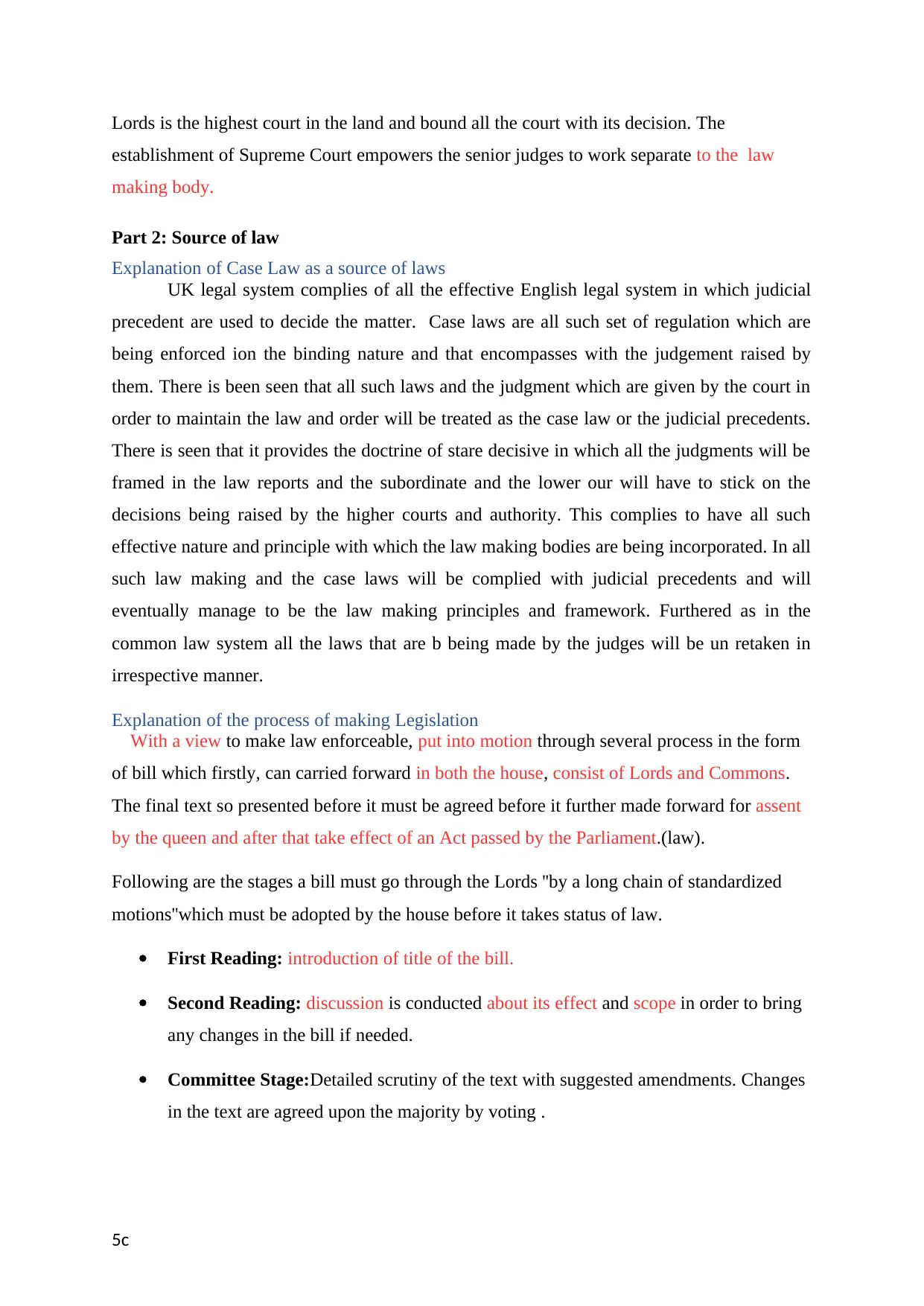
Lords is the highest court in the land and bound all the court with its decision. The
establishment of Supreme Court empowers the senior judges to work separate to the law
making body.
Part 2: Source of law
Explanation of Case Law as a source of laws
UK legal system complies of all the effective English legal system in which judicial
precedent are used to decide the matter. Case laws are all such set of regulation which are
being enforced ion the binding nature and that encompasses with the judgement raised by
them. There is been seen that all such laws and the judgment which are given by the court in
order to maintain the law and order will be treated as the case law or the judicial precedents.
There is seen that it provides the doctrine of stare decisive in which all the judgments will be
framed in the law reports and the subordinate and the lower our will have to stick on the
decisions being raised by the higher courts and authority. This complies to have all such
effective nature and principle with which the law making bodies are being incorporated. In all
such law making and the case laws will be complied with judicial precedents and will
eventually manage to be the law making principles and framework. Furthered as in the
common law system all the laws that are b being made by the judges will be un retaken in
irrespective manner.
Explanation of the process of making Legislation
With a view to make law enforceable, put into motion through several process in the form
of bill which firstly, can carried forward in both the house, consist of Lords and Commons.
The final text so presented before it must be agreed before it further made forward for assent
by the queen and after that take effect of an Act passed by the Parliament.(law).
Following are the stages a bill must go through the Lords ''by a long chain of standardized
motions''which must be adopted by the house before it takes status of law.
First Reading: introduction of title of the bill.
Second Reading: discussion is conducted about its effect and scope in order to bring
any changes in the bill if needed.
Committee Stage:Detailed scrutiny of the text with suggested amendments. Changes
in the text are agreed upon the majority by voting .
5c
establishment of Supreme Court empowers the senior judges to work separate to the law
making body.
Part 2: Source of law
Explanation of Case Law as a source of laws
UK legal system complies of all the effective English legal system in which judicial
precedent are used to decide the matter. Case laws are all such set of regulation which are
being enforced ion the binding nature and that encompasses with the judgement raised by
them. There is been seen that all such laws and the judgment which are given by the court in
order to maintain the law and order will be treated as the case law or the judicial precedents.
There is seen that it provides the doctrine of stare decisive in which all the judgments will be
framed in the law reports and the subordinate and the lower our will have to stick on the
decisions being raised by the higher courts and authority. This complies to have all such
effective nature and principle with which the law making bodies are being incorporated. In all
such law making and the case laws will be complied with judicial precedents and will
eventually manage to be the law making principles and framework. Furthered as in the
common law system all the laws that are b being made by the judges will be un retaken in
irrespective manner.
Explanation of the process of making Legislation
With a view to make law enforceable, put into motion through several process in the form
of bill which firstly, can carried forward in both the house, consist of Lords and Commons.
The final text so presented before it must be agreed before it further made forward for assent
by the queen and after that take effect of an Act passed by the Parliament.(law).
Following are the stages a bill must go through the Lords ''by a long chain of standardized
motions''which must be adopted by the house before it takes status of law.
First Reading: introduction of title of the bill.
Second Reading: discussion is conducted about its effect and scope in order to bring
any changes in the bill if needed.
Committee Stage:Detailed scrutiny of the text with suggested amendments. Changes
in the text are agreed upon the majority by voting .
5c
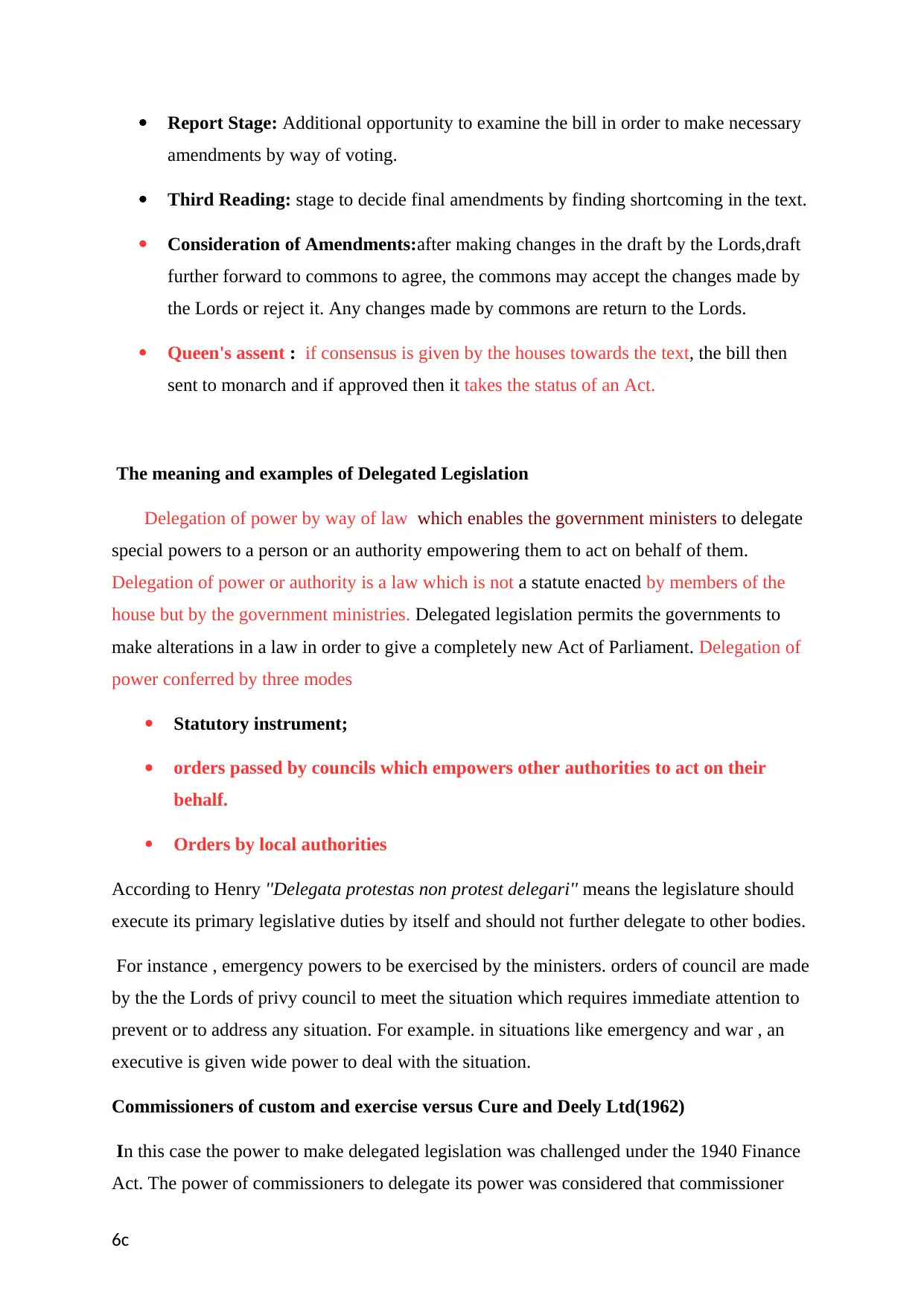
Report Stage: Additional opportunity to examine the bill in order to make necessary
amendments by way of voting.
Third Reading: stage to decide final amendments by finding shortcoming in the text.
Consideration of Amendments:after making changes in the draft by the Lords,draft
further forward to commons to agree, the commons may accept the changes made by
the Lords or reject it. Any changes made by commons are return to the Lords.
Queen's assent : if consensus is given by the houses towards the text, the bill then
sent to monarch and if approved then it takes the status of an Act.
The meaning and examples of Delegated Legislation
Delegation of power by way of law which enables the government ministers to delegate
special powers to a person or an authority empowering them to act on behalf of them.
Delegation of power or authority is a law which is not a statute enacted by members of the
house but by the government ministries. Delegated legislation permits the governments to
make alterations in a law in order to give a completely new Act of Parliament. Delegation of
power conferred by three modes
Statutory instrument;
orders passed by councils which empowers other authorities to act on their
behalf.
Orders by local authorities
According to Henry ''Delegata protestas non protest delegari'' means the legislature should
execute its primary legislative duties by itself and should not further delegate to other bodies.
For instance , emergency powers to be exercised by the ministers. orders of council are made
by the the Lords of privy council to meet the situation which requires immediate attention to
prevent or to address any situation. For example. in situations like emergency and war , an
executive is given wide power to deal with the situation.
Commissioners of custom and exercise versus Cure and Deely Ltd(1962)
In this case the power to make delegated legislation was challenged under the 1940 Finance
Act. The power of commissioners to delegate its power was considered that commissioner
6c
amendments by way of voting.
Third Reading: stage to decide final amendments by finding shortcoming in the text.
Consideration of Amendments:after making changes in the draft by the Lords,draft
further forward to commons to agree, the commons may accept the changes made by
the Lords or reject it. Any changes made by commons are return to the Lords.
Queen's assent : if consensus is given by the houses towards the text, the bill then
sent to monarch and if approved then it takes the status of an Act.
The meaning and examples of Delegated Legislation
Delegation of power by way of law which enables the government ministers to delegate
special powers to a person or an authority empowering them to act on behalf of them.
Delegation of power or authority is a law which is not a statute enacted by members of the
house but by the government ministries. Delegated legislation permits the governments to
make alterations in a law in order to give a completely new Act of Parliament. Delegation of
power conferred by three modes
Statutory instrument;
orders passed by councils which empowers other authorities to act on their
behalf.
Orders by local authorities
According to Henry ''Delegata protestas non protest delegari'' means the legislature should
execute its primary legislative duties by itself and should not further delegate to other bodies.
For instance , emergency powers to be exercised by the ministers. orders of council are made
by the the Lords of privy council to meet the situation which requires immediate attention to
prevent or to address any situation. For example. in situations like emergency and war , an
executive is given wide power to deal with the situation.
Commissioners of custom and exercise versus Cure and Deely Ltd(1962)
In this case the power to make delegated legislation was challenged under the 1940 Finance
Act. The power of commissioners to delegate its power was considered that commissioner
6c
⊘ This is a preview!⊘
Do you want full access?
Subscribe today to unlock all pages.

Trusted by 1+ million students worldwide
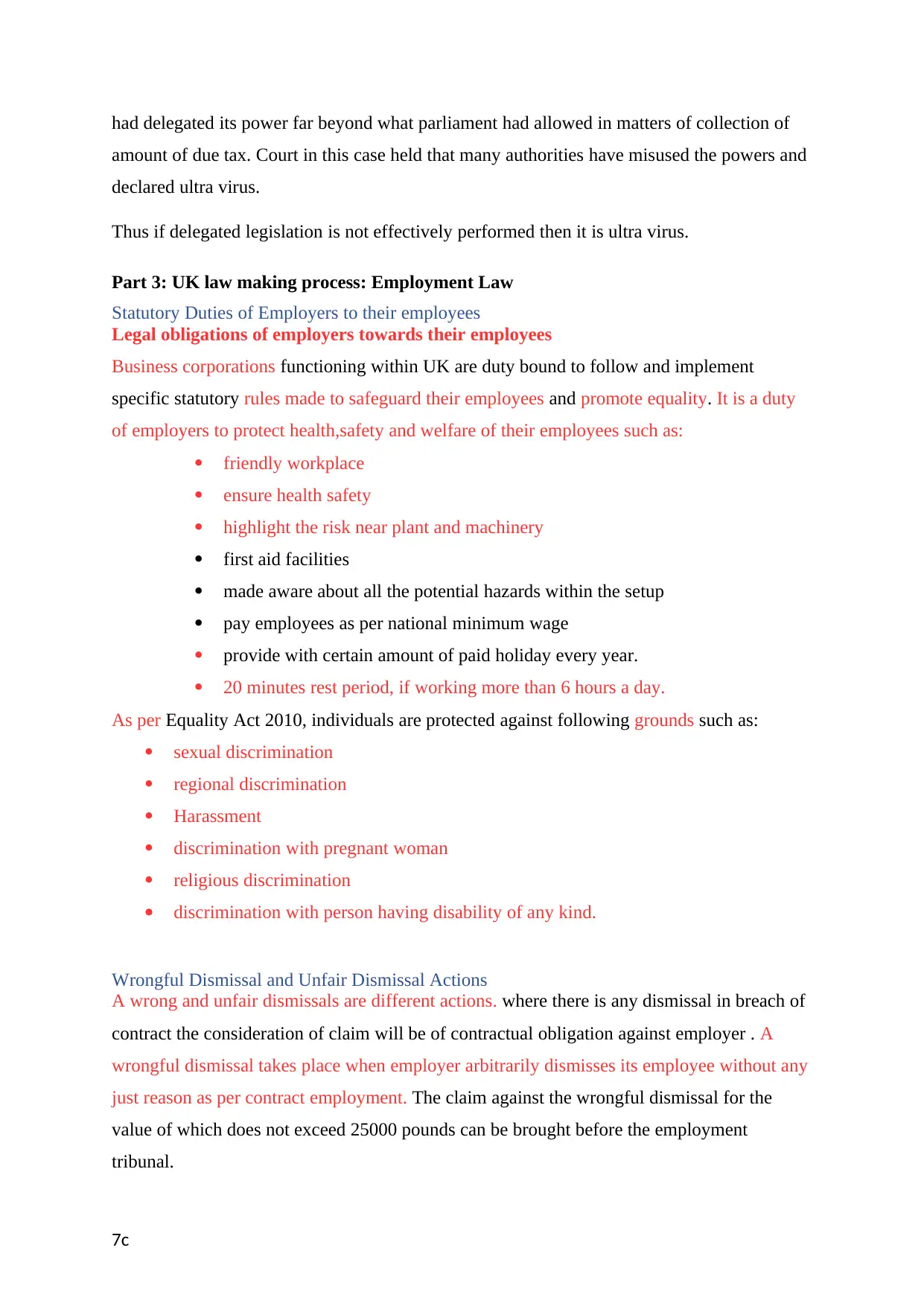
had delegated its power far beyond what parliament had allowed in matters of collection of
amount of due tax. Court in this case held that many authorities have misused the powers and
declared ultra virus.
Thus if delegated legislation is not effectively performed then it is ultra virus.
Part 3: UK law making process: Employment Law
Statutory Duties of Employers to their employees
Legal obligations of employers towards their employees
Business corporations functioning within UK are duty bound to follow and implement
specific statutory rules made to safeguard their employees and promote equality. It is a duty
of employers to protect health,safety and welfare of their employees such as:
friendly workplace
ensure health safety
highlight the risk near plant and machinery
first aid facilities
made aware about all the potential hazards within the setup
pay employees as per national minimum wage
provide with certain amount of paid holiday every year.
20 minutes rest period, if working more than 6 hours a day.
As per Equality Act 2010, individuals are protected against following grounds such as:
sexual discrimination
regional discrimination
Harassment
discrimination with pregnant woman
religious discrimination
discrimination with person having disability of any kind.
Wrongful Dismissal and Unfair Dismissal Actions
A wrong and unfair dismissals are different actions. where there is any dismissal in breach of
contract the consideration of claim will be of contractual obligation against employer . A
wrongful dismissal takes place when employer arbitrarily dismisses its employee without any
just reason as per contract employment. The claim against the wrongful dismissal for the
value of which does not exceed 25000 pounds can be brought before the employment
tribunal.
7c
amount of due tax. Court in this case held that many authorities have misused the powers and
declared ultra virus.
Thus if delegated legislation is not effectively performed then it is ultra virus.
Part 3: UK law making process: Employment Law
Statutory Duties of Employers to their employees
Legal obligations of employers towards their employees
Business corporations functioning within UK are duty bound to follow and implement
specific statutory rules made to safeguard their employees and promote equality. It is a duty
of employers to protect health,safety and welfare of their employees such as:
friendly workplace
ensure health safety
highlight the risk near plant and machinery
first aid facilities
made aware about all the potential hazards within the setup
pay employees as per national minimum wage
provide with certain amount of paid holiday every year.
20 minutes rest period, if working more than 6 hours a day.
As per Equality Act 2010, individuals are protected against following grounds such as:
sexual discrimination
regional discrimination
Harassment
discrimination with pregnant woman
religious discrimination
discrimination with person having disability of any kind.
Wrongful Dismissal and Unfair Dismissal Actions
A wrong and unfair dismissals are different actions. where there is any dismissal in breach of
contract the consideration of claim will be of contractual obligation against employer . A
wrongful dismissal takes place when employer arbitrarily dismisses its employee without any
just reason as per contract employment. The claim against the wrongful dismissal for the
value of which does not exceed 25000 pounds can be brought before the employment
tribunal.
7c
Paraphrase This Document
Need a fresh take? Get an instant paraphrase of this document with our AI Paraphraser
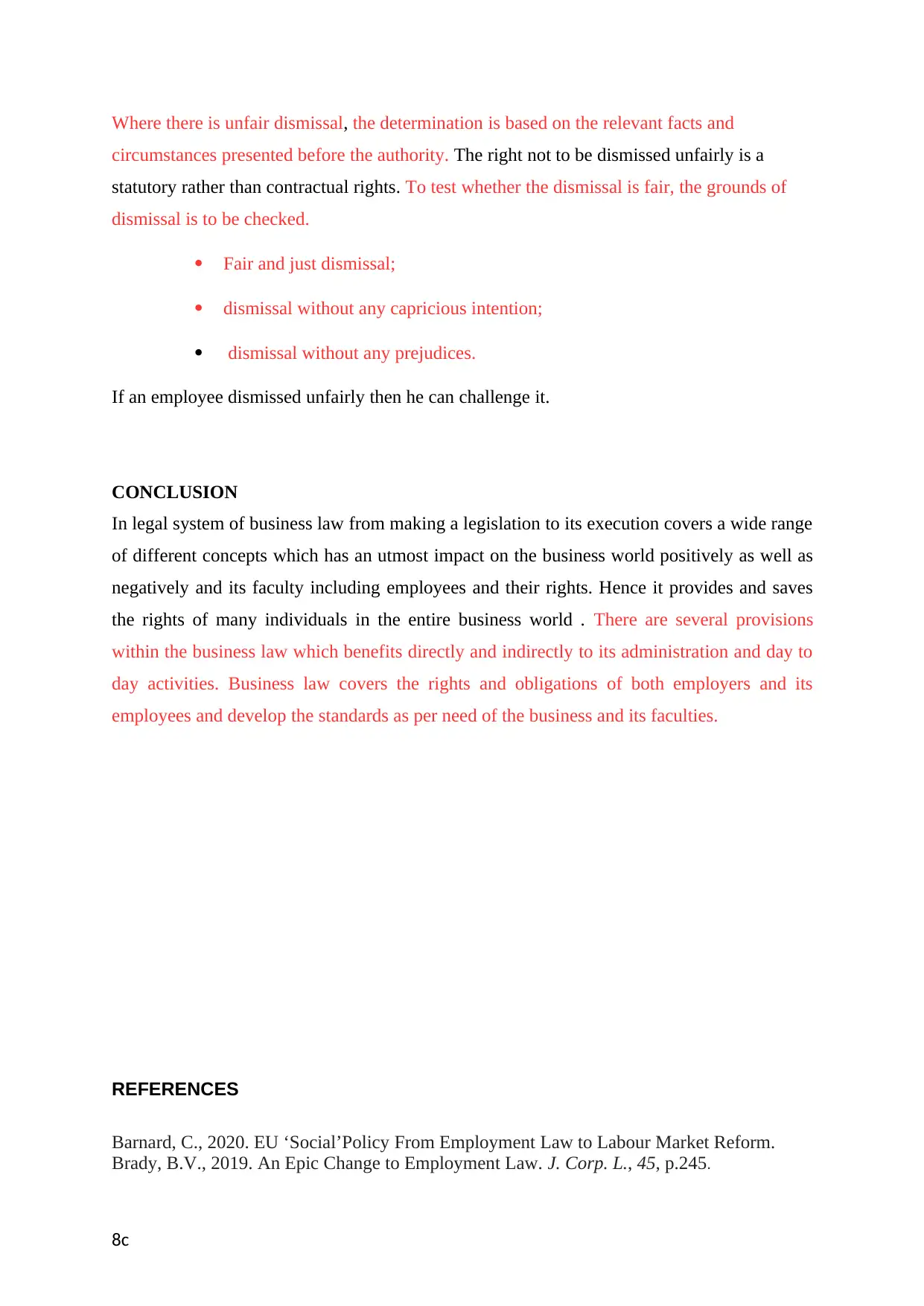
Where there is unfair dismissal, the determination is based on the relevant facts and
circumstances presented before the authority. The right not to be dismissed unfairly is a
statutory rather than contractual rights. To test whether the dismissal is fair, the grounds of
dismissal is to be checked.
Fair and just dismissal;
dismissal without any capricious intention;
dismissal without any prejudices.
If an employee dismissed unfairly then he can challenge it.
CONCLUSION
In legal system of business law from making a legislation to its execution covers a wide range
of different concepts which has an utmost impact on the business world positively as well as
negatively and its faculty including employees and their rights. Hence it provides and saves
the rights of many individuals in the entire business world . There are several provisions
within the business law which benefits directly and indirectly to its administration and day to
day activities. Business law covers the rights and obligations of both employers and its
employees and develop the standards as per need of the business and its faculties.
REFERENCES
Barnard, C., 2020. EU ‘Social’Policy From Employment Law to Labour Market Reform.
Brady, B.V., 2019. An Epic Change to Employment Law. J. Corp. L., 45, p.245.
8c
circumstances presented before the authority. The right not to be dismissed unfairly is a
statutory rather than contractual rights. To test whether the dismissal is fair, the grounds of
dismissal is to be checked.
Fair and just dismissal;
dismissal without any capricious intention;
dismissal without any prejudices.
If an employee dismissed unfairly then he can challenge it.
CONCLUSION
In legal system of business law from making a legislation to its execution covers a wide range
of different concepts which has an utmost impact on the business world positively as well as
negatively and its faculty including employees and their rights. Hence it provides and saves
the rights of many individuals in the entire business world . There are several provisions
within the business law which benefits directly and indirectly to its administration and day to
day activities. Business law covers the rights and obligations of both employers and its
employees and develop the standards as per need of the business and its faculties.
REFERENCES
Barnard, C., 2020. EU ‘Social’Policy From Employment Law to Labour Market Reform.
Brady, B.V., 2019. An Epic Change to Employment Law. J. Corp. L., 45, p.245.
8c
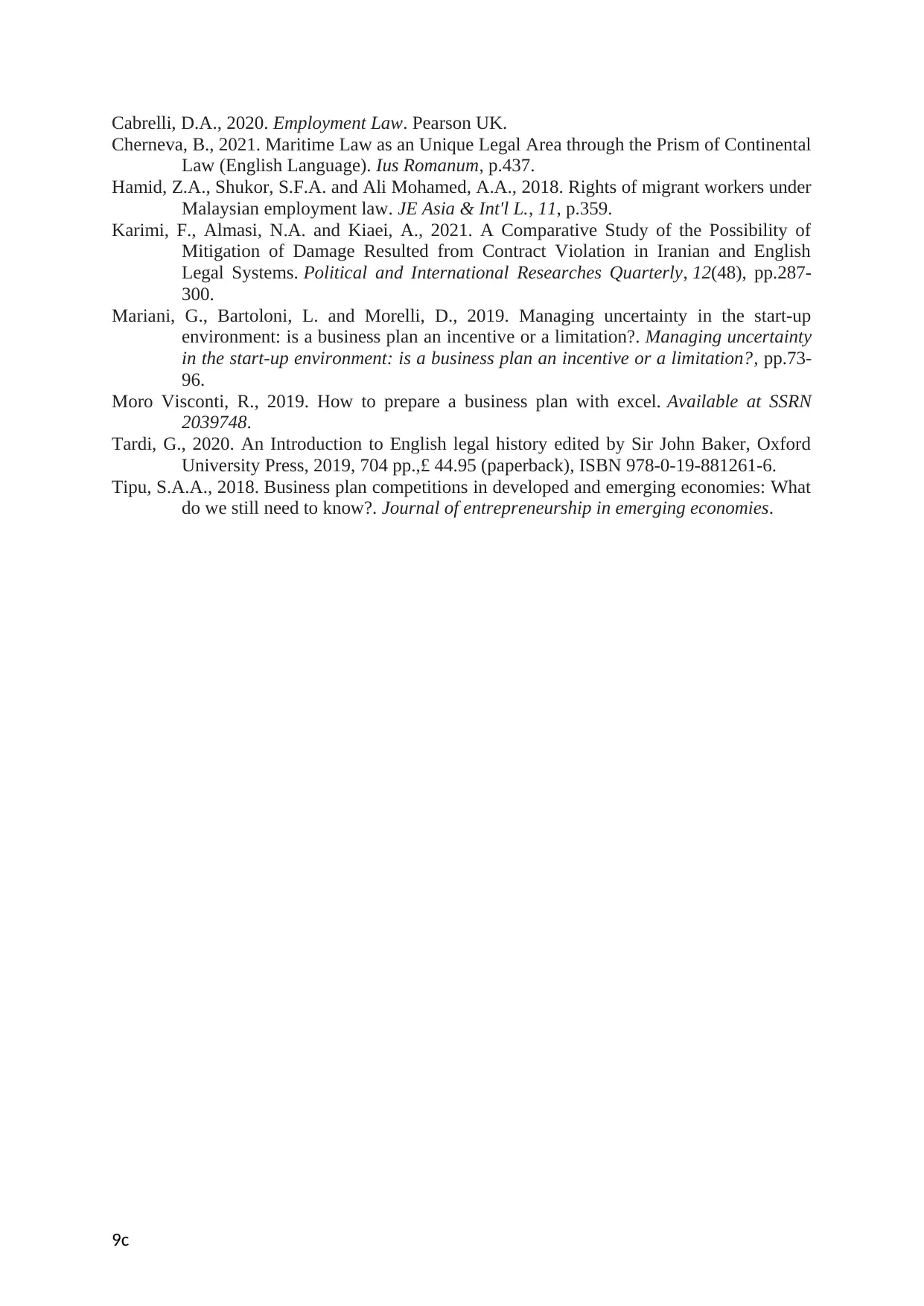
Cabrelli, D.A., 2020. Employment Law. Pearson UK.
Cherneva, B., 2021. Maritime Law as an Unique Legal Area through the Prism of Continental
Law (English Language). Ius Romanum, p.437.
Hamid, Z.A., Shukor, S.F.A. and Ali Mohamed, A.A., 2018. Rights of migrant workers under
Malaysian employment law. JE Asia & Int'l L., 11, p.359.
Karimi, F., Almasi, N.A. and Kiaei, A., 2021. A Comparative Study of the Possibility of
Mitigation of Damage Resulted from Contract Violation in Iranian and English
Legal Systems. Political and International Researches Quarterly, 12(48), pp.287-
300.
Mariani, G., Bartoloni, L. and Morelli, D., 2019. Managing uncertainty in the start-up
environment: is a business plan an incentive or a limitation?. Managing uncertainty
in the start-up environment: is a business plan an incentive or a limitation?, pp.73-
96.
Moro Visconti, R., 2019. How to prepare a business plan with excel. Available at SSRN
2039748.
Tardi, G., 2020. An Introduction to English legal history edited by Sir John Baker, Oxford
University Press, 2019, 704 pp.,£ 44.95 (paperback), ISBN 978-0-19-881261-6.
Tipu, S.A.A., 2018. Business plan competitions in developed and emerging economies: What
do we still need to know?. Journal of entrepreneurship in emerging economies.
9c
Cherneva, B., 2021. Maritime Law as an Unique Legal Area through the Prism of Continental
Law (English Language). Ius Romanum, p.437.
Hamid, Z.A., Shukor, S.F.A. and Ali Mohamed, A.A., 2018. Rights of migrant workers under
Malaysian employment law. JE Asia & Int'l L., 11, p.359.
Karimi, F., Almasi, N.A. and Kiaei, A., 2021. A Comparative Study of the Possibility of
Mitigation of Damage Resulted from Contract Violation in Iranian and English
Legal Systems. Political and International Researches Quarterly, 12(48), pp.287-
300.
Mariani, G., Bartoloni, L. and Morelli, D., 2019. Managing uncertainty in the start-up
environment: is a business plan an incentive or a limitation?. Managing uncertainty
in the start-up environment: is a business plan an incentive or a limitation?, pp.73-
96.
Moro Visconti, R., 2019. How to prepare a business plan with excel. Available at SSRN
2039748.
Tardi, G., 2020. An Introduction to English legal history edited by Sir John Baker, Oxford
University Press, 2019, 704 pp.,£ 44.95 (paperback), ISBN 978-0-19-881261-6.
Tipu, S.A.A., 2018. Business plan competitions in developed and emerging economies: What
do we still need to know?. Journal of entrepreneurship in emerging economies.
9c
⊘ This is a preview!⊘
Do you want full access?
Subscribe today to unlock all pages.

Trusted by 1+ million students worldwide
1 out of 9
Related Documents
Your All-in-One AI-Powered Toolkit for Academic Success.
+13062052269
info@desklib.com
Available 24*7 on WhatsApp / Email
![[object Object]](/_next/static/media/star-bottom.7253800d.svg)
Unlock your academic potential
Copyright © 2020–2025 A2Z Services. All Rights Reserved. Developed and managed by ZUCOL.
